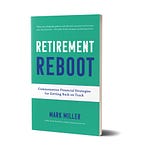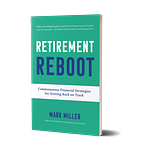Welcome to the Retirement Rebootcast. That’s what I’m calling this special podcast series on my new book - Retirement Reboot: Commonsense Financial Strategies for Getting Back on Track. The book is out this month, so I invited some of my favorite experts on retirement to join me on the show to talk about some of its key ideas.
I wrote Retirement Reboot with a very particular group of readers in mind: people getting close to retirement who are not financially prepared. In other words, people who have not been able to save much -or anything - for retirement. They’re headed toward a retirement living only on Social Security, which typically replaces about 40% of their working income. Meanwhile, the rule of thumb is that most of us will need to replace at least 70% of our wage income when we retire.
The book offers a series of strategies for improving on that math. The key chapters discuss the importance of making a plan, timing your retirement and how to get the most from Social Security and Medicare. I also discuss strategies for building savings, even late in the game, and tapping home equity. From there, I go on to discuss managing your career late in the game, the value of professional advice, how to manage long-term care risk and how to approach the idea of aging in place.
For this episode, let’s have a conversation about Medicare. Along with Social Security, there’s nothing that will have a more important impact on your retirement security than making smart choices about navigating Medicare. And this actually is a more complicated challenge than claiming Social Security. Medicare is a great program, and most seniors love it once they enroll. But the program has evolved over the last couple decades in ways I think are unfortunate. There has been an enormous amount of needless privatization of coverage, whether that’s the Part D prescription drug program, or Medicare Advantage, the commercial managed care alternative to traditional Medicare.
In Retirement Reboot, I walk readers through my somewhat counterintuitive argument about the choice between traditional Medicare and Advantage. The Advantage program has been growing quickly in recent years, but I lay out reasons why you’re much better off in the traditional program - assuming you can afford the somewhat higher upfront premium costs.
For this episode, I invited two of the most knowledgeable Medicare experts I know to join me. Both played a critical role in helping to review and comment on the Medicare chapter of Retirement Reboot. My guests are Tricia Neuman, executive director of the Medicare program at the Kaiser Family Foundation, and Fred Riccardi, president of the Medicare Rights Center. Kaiser is one of the most important, authoritative sources of research and information on health care in the U.S. And the Medicare Rights Center is a leading advocacy and consumer assistance organization.
This episode of the podcast runs a little longer than usual - around an hour. But I hope you’ll stick around for the entire conversation, because Tricia and Fred offer some terrific insights. We talked about the pitfalls to avoid when you first sign up for Medicare, the key differences between traditional Medicare and Advantage, how to pick a Medigap policy, where to get expert help with Medicare choices - and a whole lot more.
Click the player icon at the top of the newsletter to listen to the podcast. You can also find it on Apple Podcasts or Spotify (search for Retirement Revised).
Liked the book? Do me a favor - please review it!
If you’ve already read Retirement Reboot, please do me a small favor and review it on Amazon. You need not have purchased your copy at Amazon to leave a review there - and positive reviews are one of the most important factors driving in book sales. You can find the button to leave a review in the lower third of the Amazon page for Retirement Reboot.
A new Retirement Reboot excerpt
Morningstar published an excerpt from the chapter of Retirement Reboot that examines strategies for optimizing Social Security. In this excerpt, I explain why Social Security benefits are so valuable, the annual cost-of-living adjustment, how benefits are calculated and how to time your claim of benefits. If you missed last week’s podcast on this topic, you can find here. The episode featured a conversation with two of the country’s best experts on Social Security - Mary Beth Franklin of Investment News and William Reichenstein of Social Security Solutions.
What I’m writing
2022 was a consequential year in Washington, D.C. for changing retirement systems in the United States. But the changes are a mixed bag—some are very good, while others nibble around the edge of root problems. And some reforms will assist only the most affluent households who need help least.
What I’m reading
Medicare will begin penalizing nursing homes that give residents a false label of schizophrenia, a practice that many facilities have used to skirt restrictions on antipsychotic drugs, which can be especially dangerous for older people . . . Nurses are burned out and fed up, with good reason . . . How to make a caregiving plan . . . Older And disabled Americans are languishing for years on waiting lists for home-based care.











